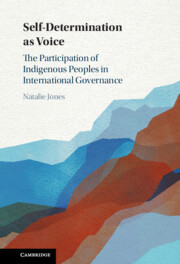Book contents
- Self-Determination as Voice
- Self-Determination as Voice
- Copyright page
- Dedication
- Contents
- Acknowledgements
- Table of Cases
- Table of Treaties
- Abbreviations
- Introduction
- 1 Participation in International Governance and the Logic of Self-Determination
- 2 Finding Support for Indigenous Peoples’ Participation in the Sources of International Law
- 3 The Proliferation of Indigenous Peoples’ Participation, 1982–2007
- 4 Emerging Legal Status? Participation of Indigenous Peoples, 2007–2022
- 5 Conclusion
- Bibliography
- Index
4 - Emerging Legal Status? Participation of Indigenous Peoples, 2007–2022
Published online by Cambridge University Press: 04 January 2024
- Self-Determination as Voice
- Self-Determination as Voice
- Copyright page
- Dedication
- Contents
- Acknowledgements
- Table of Cases
- Table of Treaties
- Abbreviations
- Introduction
- 1 Participation in International Governance and the Logic of Self-Determination
- 2 Finding Support for Indigenous Peoples’ Participation in the Sources of International Law
- 3 The Proliferation of Indigenous Peoples’ Participation, 1982–2007
- 4 Emerging Legal Status? Participation of Indigenous Peoples, 2007–2022
- 5 Conclusion
- Bibliography
- Index
Summary
Chapter 4, ‘Emerging Status as Law? Participation of Indigenous Peoples in International Governance, 2007–2022’, continues the narrative from the point of the adoption of the UNDRIP in September 2007. In this period, the general trend of the proliferation of participatory policies and mechanisms identified in Chapter 3 only intensified. Organizations that had not previously attempted to include Indigenous peoples in a systematic way now adopted mechanisms and policies to do so, while those that had previously instituted such mechanisms or policies sought to enhance them. This chapter maps the contours of this continuing trend, showing how the participation zeitgeist spread through numerous UN organs and international organizations. It assesses the question of states’ and international organizations’ motivations for enabling Indigenous peoples to be heard in such fora. It shows how states and international organizations now increasingly justified participation policies with reference to the UN Declaration on the Rights of Indigenous Peoples. It demonstrates how in nearly all cases barriers to full and effective participation remain.
Keywords
- Type
- Chapter
- Information
- Self-Determination as VoiceThe Participation of Indigenous Peoples in International Governance, pp. 154 - 257Publisher: Cambridge University PressPrint publication year: 2024



